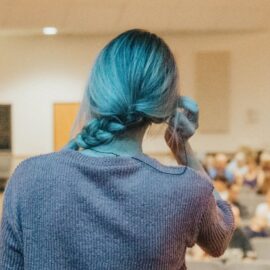
What do you believe to be true? How sound are your beliefs? How do your beliefs impact your life?
We all believe something, and we all live according to what we believe. So, what we believe matters. It’s wise to examine our beliefs to get clarity on what they are, why we hold them, and what difference they make in our lives.
Continue reading for scores of belief questions that will help you move toward clarity and purpose.
Belief Questions
We’ve put together 12 exercises chock full of belief questions that you can simply ask yourself or use in a meaningful group discussion. Each exercise is based on a book that you might check out if you want to take the discussion further.
Exercise 1: Rewrite Your Beliefs as Hypotheses
You likely believe that precise knowledge is valuable and that maintaining strong beliefs shows integrity. Yet social scientist and Wharton professor Adam Grant disagrees, arguing in his book Think Again that reconsideration, or the ability to reconsider your views, is much more valuable than knowledge or loyalty to your beliefs.
Grant says that, to have an open mind, you must treat your beliefs not as sources of your identity but as hypotheses to be examined. In this exercise, we will explore some of your beliefs, reframe them as questions or hypotheses, and see how this changes your perspective.
- Write down one of your beliefs. (For example, “I need to be financially successful to have a meaningful life,” or, “My political party is superior.”)
- Now reframe this belief as a hypothesis to be tested rather than a statement of fact. To do this, rewrite your beliefs as questions. (For example: Is financial success the only thing that defines a meaningful life? What makes one political party superior to another?)
- Has exploring these questions caused you to rethink some of your beliefs? Explain your answer.
- How does reframing your beliefs as questions change your perspective?
Exercise 2: Examine Your Beliefs
A few years ago, I wrote a handbook that steps you through the process of examining your beliefs and the evidence for them. In Building Evidence-based Beliefs, I argue that evidence-based beliefs are less likely to be shaken and more likely to be true, and I share a systematic way to establish a habit of building thoughtful, sound beliefs.
- How likely is it that 100% of your beliefs are true?
- If what you believe isn’t true, would you want to know that?
- Think about a particular belief you have, and answer the following questions about it:
- When did you first believe it, and why?
- Are you thinking, or are you merely leaning on what you accepted long ago?
- Are you thinking for yourself, or are you merely accepting what others believe?
- How much is what you believe based on whom you trust?
- What could cause you to stop believing what you believe?
- If you were the only one who believed what you believe, would you still believe it?
- What difference do sincerity and passion make? If you’re sincere in your belief—if you’re passionate about it—does that strengthen the belief statement itself or just your belief in it?
- What happens if you treat your beliefs like facts?
- How do your beliefs impact your life?
Exercise 3: Recognize There’s Information That Doesn’t Support Your Beliefs
In Stumbling on Happiness, award-winning Harvard professor Daniel Gilbert offers an explanation for what are, in his view, unavoidable poor decisions: You fabricate a large part of your reality—your memories of the past, perception of the present, and vision of the future.
Strengthen your awareness that you base your beliefs and actions only on certain information—usually, information that you agree with—and that you therefore interpret your reality, rather than view it objectively.
- Note some of your current lifestyle choices and habits. These could include dietary choices (Are you a vegan or vegetarian, for instance?), exercise choices (Do you exercise regularly? At what time of the day?), recreational choices (How do you spend your free time? Playing sports? Watching TV?), or any other conscious choice you’ve made about how to lead your daily life.
- Now, briefly write down the beliefs that underpin those lifestyle choices. Why have you made these dietary, exercise, recreational, or other choices? (For instance, you might believe that humans should protect the environment, which led you to adopt a freegan diet. Or you might believe that heavy exercise more than twice a week can damage your body, which is why you never exercise more frequently than that.)
- Describe the information you received that led to the beliefs you outlined above. What did you learn, see, or experience that formed the basis for your beliefs? (For example, you learned about climate change in school, which led you to believe you must protect the environment. Or you saw your father damage his ankle on his third run of the week, which led you to avoid frequent, heavy exercise.)
- Next, consider what alternate information would undermine your beliefs. You don’t have to substantiate it—just think of ideas or data that would force you to believe the opposite of what you now believe. (If you were to learn, for instance, that humans don’t cause climate change, you might not believe that we have a duty to protect the environment. Or, if you were to learn that exercising every day is the best way to avoid injury, you’d no longer believe that exercising more than twice a week can harm your body.)
- How does considering the possibility of alternative information make you feel about your habits and the beliefs that underpin them? (For instance, do you now feel unsure whether or not exercising more than twice a week truly is unhealthy? Are you feeling intrigued and open to researching this—and possibly changing your habits as a consequence? Or do you feel validated because the alternative information wouldn’t convince you to change your ways?) Explain your answer.
Exercise 4: Uncover Your Misbeliefs
In Thinking in Bets by Annie Duke, you’ll find out how to work around your biases, objectively evaluate your beliefs, learn from your past, and ultimately get better at making good decisions.
Try Googling “list of common myths” right now. Your search results should turn up any number of articles on the topic. Click one of them, and see how far you have to scroll before you find something you believe to be true that is false.
- What was the myth that you’d believed? Why did you believe it?
- If you’d had to bet on that belief before looking it up, how much would you have bet? (In other words, how sure were you that it was true?)
- What beliefs do you hold that you would feel confident betting on?
- What steps can you take to reduce your likelihood of internalizing false information in the future?
Exercise 4: Examine Your Claims to Knowledge
In The Demon-Haunted World, renowned astronomer and science popularizer Carl Sagan contends that many people still cling to unscientific beliefs and ideas at an alarming level. He tries to counteract these dangers by teaching the scientific method and encouraging the application of critical and skeptical thinking in all facets of life.
Sagan argues that we often are resistant to new discoveries because they challenge our existing beliefs. Here, examine your beliefs and think about how they might affect your openness to new information.
- Think about your core beliefs. Pick something you believe in that doesn’t have enough scientific backing to be considered fact. This could be a religious or spiritual belief or simply an opinion you have that shapes the way you view the world. Why do you think you hold this belief?
- How does this belief affect your life and the decisions you make, large or small?
- What would it take for you to dismiss this belief or believe in something else? Are you more likely to investigate new information if it upholds your beliefs or if it opposes them? Why do you think that is?
Exercise 5: Identify Your Press Secretary
In The Righteous Mind, Jonathan Haidt explains that we all have a “press secretary,” constantly justifying everything: In other words, we all have confirmation bias and are constantly on the hunt, like a press secretary, for evidence that justifies our way of thinking. Simultaneously, we ignore anything that might challenge it.
Consider times in your own life that your press secretary was working overtime.
- Describe a time recently when you changed your mind about something (anything from a political opinion to how you felt about a restaurant’s service). What was the situation?
- What did you believe before? How did you justify this belief to yourself and others?
- Why did you change your mind? (Did the opinion of someone you respect influence your thinking? Were you trying to gain acceptance in a group? Did you spend time reevaluating the evidence?)
- How do you justify your new belief to yourself and others?
Exercise 6: Distinguish Belief, Knowledge, and Experience
In Ways of Seeing, critic John Berger argues that, throughout history, the way we see art has been manipulated by a privileged minority to preserve their social and economic dominance. Berger tells us that what we believe, know, and have experienced influences our interpretation of images. Analyze your own reaction to an image using this insight.
Take a look at the painting below.
- In one or two sentences, what does the image make you think or feel?
- What is one belief you hold that may have influenced your reaction?
- What is something you know that influenced your reaction?
- Finally, what is an experience you’ve had that influenced your reaction?
Exercise 7: Live in Harmony With Your Beliefs
In The Daily Stoic, Ryan Holiday and translator Stephen Hanselman share insights from the ancient Stoic philosophers on how you too can live a good life. At the core of Stoicism is the belief that the cardinal virtues—self-control, courage, justice, and wisdom—are the source of internal stability and the measure of a good life.
The Stoics also believed in living virtuously. Consider how you might motivate yourself to live in a way that’s consistent with your deeply held beliefs, like Marcus Aurelius. He reminded himself that other people depended on him to do what was right even if he didn’t feel like it. Express one of your most deeply held beliefs in a concise statement (e.g., “All living things have value”). Expressing your belief in writing can draw your attention to it and renew your motivation.
Exercise 8: Put Faith to the Challenge
In The God Delusion, University of Oxford biologist and anti-religion activist Richard Dawkins seeks to demystify religion and discredit faith. He argues that, ultimately, we as humans must free ourselves from our self-imposed shackles by destroying faith and religion and positively embracing the full potential of our species.
- What are your most passionately held beliefs (religious or otherwise)?
- Do you have evidence for these beliefs? If so, what is it?
- What’s the difference between evidence and proof?
- How would you feel if someone were to challenge these beliefs or present evidence to you that they were false? Do you think you’d be open-minded hearing someone question them? Why or why not?
- Do you think that faith deserves automatic respect or deference from society? Why or why not?
Exercise 9: Practice Doubting Every Message
In The Fifth Agreement, don Miguel Ruiz and don Jose Ruiz describe five “agreements” to make with yourself that adjust the way you see the world and your place in it. Those who have mastered the five agreements, the authors say, completely accept themselves as they are, and accept everyone else as they are—and the result is eternal happiness.
The fifth step of the Toltec path to enlightenment asks us to doubt every message we hear. Start by doubting just one message.
- Think of an assertion of truth you heard recently. What was the message? (For example, an advertisement for a diet pill might send the message that you need to lose weight.)
- Who benefits from you believing that message? What do they gain from your belief? (For example, the company that makes the diet pill might get your money if they convince you that you should lose weight.)
- Think as objectively as you can. Is that message true, or is it someone else’s skewed version of reality? (There are no right or wrong answers; what’s important is that you’re taking the time to think about it instead of accepting the message at face value.)
Exercise 10: Understand and Repair Your Negative Beliefs
In When Helping Hurts, Christian economic development experts Steve Corbett and Brian Fikkert express concern that many missionary efforts do more harm than good because the people who organize them misunderstand the true nature and causes of poverty.
Reflect on your views on God, yourself, others, and creation, and consider how negative feelings and opinions about them might limit your potential.
- Reflect on your views on God, yourself, others, and creation (the planet, with its ecosystems and natural resources). Identify at least two negative feelings you’ve recently had about each of them. (For example, have you been irritated with anyone lately?)
- For each instance you wrote down, identify a belief you formed as a result of that negative feeling. (For example, if you’ve been irritated with anyone lately, how did that sense of irritation affect your view of them as a person?)
- Now, consider how those beliefs might have negatively affected your life. (For example, if you’ve been avoiding contact with someone because you have a negative view of them, how might that limit your—or their—opportunities for success in any area of life?)
- Finally, what could you do to mend each of the relationships you’ve identified?
Exercise 11: Examine Your Beliefs About the Future
In Zero to One, entrepreneur and venture capitalist Peter Thiel discusses how your beliefs about the future impact your life now. If you’re optimistic, you tend to think of the future as definable and definite, as something you can understand and shape. If you’re a pessimist, you think of it as uncertain and indefinite; since it’s random, you can’t intelligently predict or plan for it.
- What’s your view of the future? Are you an optimist or a pessimist? Explain your answer.
- How much of a role do you believe luck plays in success?
- How have your beliefs about the future affected the way you pursue your goals?
Exercise 12: Challenge Conventional Beliefs
In Zero to One, Thiel contends that the truth is sometimes the opposite of what everyone believes. Make a list of the most common conventional beliefs you’ve heard (things that are assumed to be true).
- What is the opposite of each of these beliefs?
- Could any of the opposite statements be true? If so, what are the implications?
- What’s something you believe that very few others believe?
- What’s a promising area that has a ton of potential value but that very few people are looking at?






